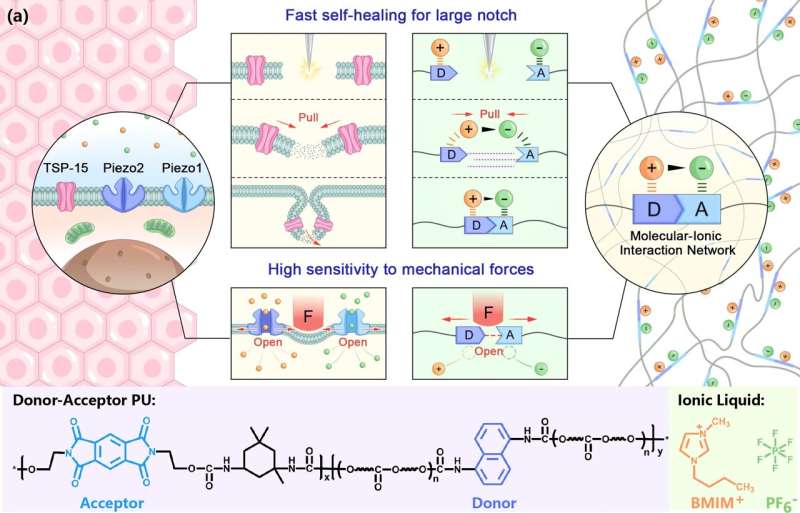High-performance iontronic skin with excellent self-healing efficiency and sensitivity. Credit: NIMTE
Researchers led by Prof. Zhu Jin at the Ningbo Institute of Materials Technology and Engineering (NIMTE) of the Chinese Academy of Sciences have developed a novel mechano-responsive elastomer, i-DAPU, achieving high-performance iontronic skin that integrates self-healing and synchronous sensing.
Their study is published in Advanced Functional Materials.
Biomimetic flexible sensors have attracted global attention in the field of intelligent tactile perception. Using mechano-responsive elastomer as the dielectric material, iontronic skin is a representative emerging category of biomimetic flexible sensors. The iontronic skin can replicate the soft touch and self-healing properties similar to human skin after injury, and imitate the pressure-sensing function of receptor cells.
However, previous studies have mainly focused on improving a single function, with less emphasis on the synchronous enhancement of self-healing efficiency and sensitivity of intronic skin.
Inspired by transmembrane proteins such as TSP-15, Piezo 1, and Piezo 2, which can recruit repair factors to facilitate cellular membrane self-repair, the researchers developed multifunctional molecular-ionic regulatory sites within a polyurethane/ionic liquid (PU/IL) composite system.
Donor-acceptor (D-A) self-assembly groups were integrated into the main chain of polyurethane, and then co-blended with the ionic liquid [BMIM]+[PF6]-, thus contributing to a novel mechano-responsive elastomer, i-DAPU.
Using i-DAPU as the dielectric material, the developed iontronic sensor, i.e., DA-skin, achieved excellent traction-assisted self-healing efficiency of 72 μm min-1 and superior dual-channel synchronous sensitivity of 7012.05 kPa-1.
In addition, the DA-skin was applied in clinical medicine for subtle change detection in muscle strength. Based on deep learning algorithms for signal processing, intelligent muscle strength level classification was achieved with an impressive accuracy rate of 99.2%.
This study provides new design concepts and research strategies for the development of high-performance iontronic skin and shows great promise for health care applications.
More information: Chao Chen et al, Transmembrane Inspired Mechano‐Responsive Elastomers with Synergized Traction‐Assisted Healing and Dual‐Channel Sensing, Advanced Functional Materials (2024). DOI: 10.1002/adfm.202402380
Journal information: Advanced Functional Materials
Provided by Chinese Academy of Sciences
























